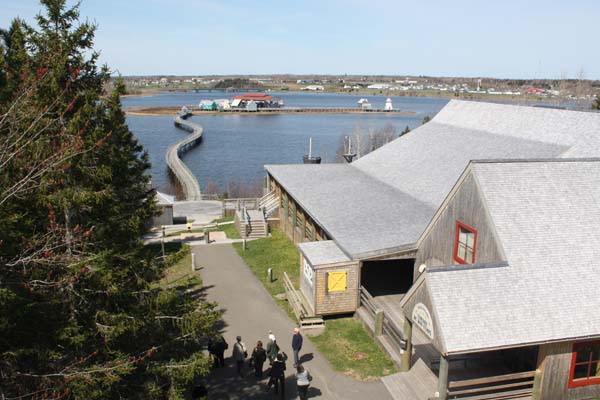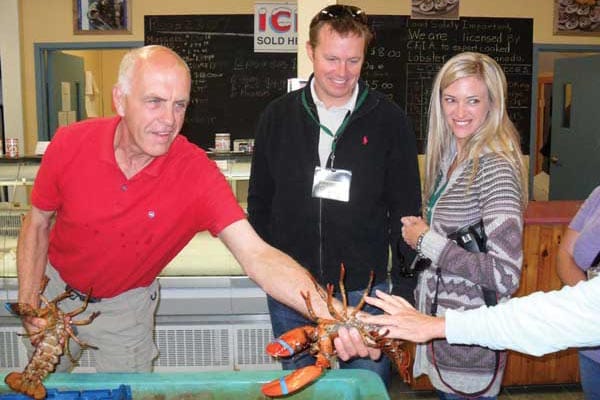Why you should plan a day trip (or longer) to Cormack
by Shelley Cameron-McCarron
Cormack, a historic farming community that Second World War veterans and their brides settled, is the Newfoundland hidden gem you’ve never heard of but should have on your radar. A 10-minute drive from the Deer Lake airport, Cormack is history-rich and offers Indigenous farm and forage tours, a popular craft brewery, a honeybee operation, parks, and salmon jumping massive falls on their way upriver.
Craft brewer Robert Sutton estimates 250,000 people a year drive by the turnoff to Cormack, a historic farming community near the foothills of the Long Range Mountains in western Newfoundland, on the doorstep of Gros Morne National Park.
It’s where they’ll find a fascinating day trip destination.
“There’s enough to make you turn off and explore,” says Sutton, who grew up here, in one of the province’s largest communities in terms of land mass (there are huge tracts of farmland) and a small population of about 500 people.
High among those reasons is Cormack’s history. Founded following the Second World War, the town had its start under a government program intended to both rejuvenate the island’s declining agricultural industry and be a community for returning war veterans. Originally known as Upper Humber Land Settlement, war veterans from across the province, together with their wives — including many war brides — pioneered the community in every sense. They each received a shell of a home, 20 hectares of land, and some farming implements, and had to make their way on this forested, wild, rugged land.
Today, their story combines with an up-and-coming tourism experience that makes Cormack, renamed decades ago after Newfoundland explorer William Cormack, an ideal road trip destination.
Take a deep breath
“It’s a quiet community, but there’s a lot happening. You can take a deep breath and relax,” says Sutton, co-owner of Crooked Feeder Brewing Co., a craft brewery and taproom in the former sawmill his family operated for 25 years. The brewery’s “where are you from” map sports pins from Ecuador, Brazil, Africa, Poland, and every continent.
Customers come especially for the sour beers (made with as much local fruit as possible) and for sought-after pours like Good Vibrations, Gros Morne Coffee Porter, and the Texas barbecue menu (pulled pork sandwiches, brisket burgers, rib dinners).
People are seeing the potential of Cormack, a phenomenal winter and snowmobile destination too, with its unique history, modern way of life, accommodations, and things to do, says Sutton.
Even better, there’s a feeling the community is in it together.
“The town’s business community is very supportive,” says Sutton. He points out that one of their beers, Rideout Red, is named after Rideout’s Dairy and Produce Farm, today one of Newfoundland and Labrador’s largest and most well-known farming operations, still run by descendants of the original owners. “They’d do anything in the world for you.”

Photo Credit: ROCKY BROOK ACRES
Sleep like a local
“It’s not your typical Newfoundland town. It’s not on the ocean and properties are not close together,” says Lauralee Ledrew. She and her husband Mark run Upper Humber Settlement (upperhumbersettlement.ca), a FarmStay B&B with farm-to-table breakfasts and peaceful sleeps. If you open a window, you may hear a rooster crowing, geese gobbling in the field. The farmstead has a roadside self-serve “honesty” market (where it’s trusted that people will pay for products), offers natural-grown produce, vegetables, jams and jellies. They offer experiential packages such as an Indigenous Medicine Wheel and Fire Circle Experience and a three-day Live Like a Local offering.
Ledrew agrees there are many reasons to turnoff into Cormack, 25 kilometres from Gros Morne National Park’s entrance, and an hour’s drive from Corner Brook.
Among them is Sir Richard Squires Memorial Provincial Park, “Big Falls,” as locals call it, which offers camping, and a spectacular salmon show. Over 30,000 Atlantic salmon migrate to their spawning grounds on the mighty Humber River, and in July and early August, visitors can watch salmon, returning to their home, jump off the massive falls.
The park makes for a particularly lovely evening drive to watch the sunset, says Roseann Brake, owner of family-run Rocky Brook Acres suites and holiday homes, who grew up in Cormack, the daughter of one of the original veterans.
Coming to Cormack, “gets you in a different place, a different mindset,” she says. Biking the back roads is one of her favourite activities, she says, with some 26 kilometres of intertwined, little travelled, mostly-dirt roads found off the one main road that runs through Cormack.
Town history is proudly on display in interpretive panels at both the Heritage Centre at Cormack Community Centre and at the local dog and day park.
Cormack Bee Company is a must-stop for a tour and gift shop browse, as is visiting shops like Sea Salt and Twig, and lapping up fresh cream, cheese, butter, and meat from local operators.
Veterans and war brides
Ledrew says many people who visit are interested in, and find connections, to the veterans and their brides. “It just gives you a different side of Newfoundland. The history is so recent,” she says. “You’ll learn how the rough, rugged and harsh conditions have shaped the people of Newfoundland. Our story is in our grandparents’ memory. The community is trying to tell the story and why this place matters, to share the history.”
She says her mother, who grew up here, always talked about Cormack. “There’s a sense of community. It’s belonging. I belong here.”
Brake likes to joke life got brighter in 1966, the year the town received electricity, and the year she was born. Growing up, she never thought anything of hearing dialects from Wales, England, or Scotland, but as she got older, she became interested in the history.
Settlers had it rough, she says, receiving a house, a few basic implements, a barn, and just two usable hectares — the rest they had to clear. “It sounded like a dream, but it was anything but.” From the outset, there were challenges, from trying to grow crops on rocky ground and in Newfoundland’s moody climate, to that lack of electricity until the mid-60s, and many left. Those who stayed learned to carve out a life for themselves.
After working away, Brake moved back in 2010, buying the family business and rebranding it as Rocky Brook Acres. She added war bride suites, and storyboards telling their personal stories.
“I love our history, how hard people had to work to carve out a living,” she says. “Many did stay and did create this community for their sons, daughters, and grandchildren. We have something special and unique to offer.”



